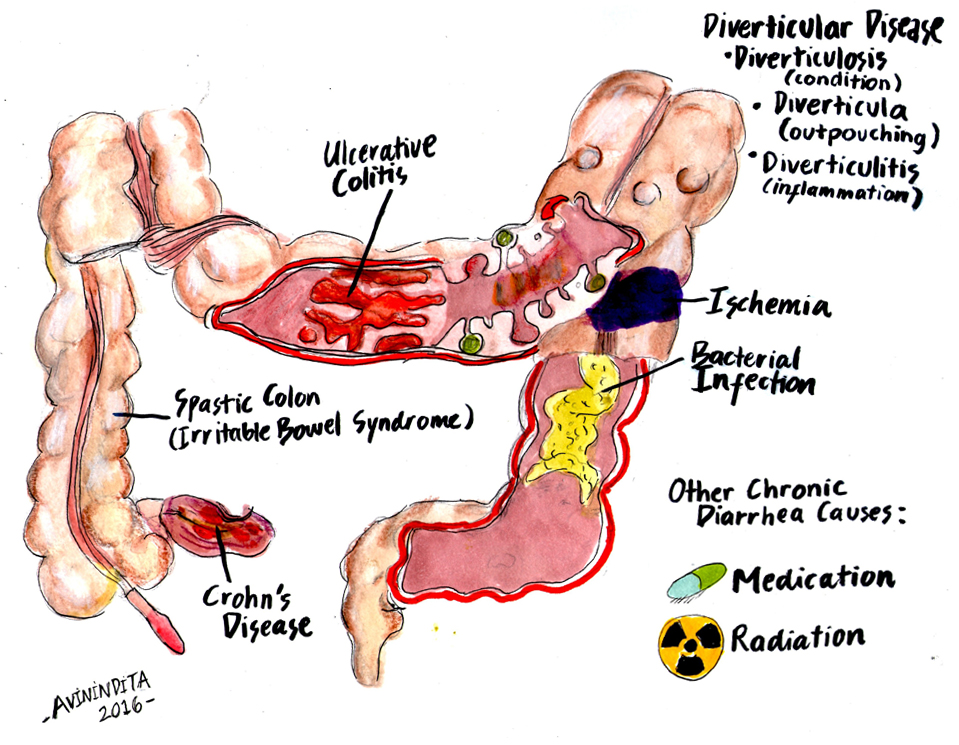- Home
- About Us
- Services
- Treatments
- Acid Reflux
- Allergic Rhinitis
- Alcoholic Fatty Liver
- Ankylosing Spondylitis
- Anxiety / Stress
- Arthritis
- Asthma
- Cervical Spondylitis
- Celiac Infection
- Colitis
- Constipation
- Dermatitis
- Detox Programme
- Diabetes (Madhumeha)
- Hair Fall
- Headache
- Hormonal Imbalance
- Hypertension
- Insomnia
- Irritable Bowel Syndrome
- Lungs Disease
- Migraine
- Neurological Disorder
- Non Alcoholic Fatty Liver
- Obesity Management
- Pain Management
- PCOD
- PCOS
- Sciatica Pain
- Sinusitis
- Skin Disorder
- Slip Disc
- Stress Management
- Thyroid
- Weight Management
- Techno-Ayurveda
- Media
- Blog
- Contact Us

Colitis
Understanding Colitis
Colitis is an inflammation of the colon (large intestine) that can cause a range of symptoms, including abdominal pain, diarrhea, fatigue, and sometimes blood in the stool. The condition can be triggered by a variety of factors, such as infections (bacterial, viral, or parasitic), autoimmune diseases like ulcerative colitis and Crohn’s disease, or reduced blood flow to the colon, known as ischemic colitis. Other potential causes include medication side effects, allergic reactions, and radiation therapy. Colitis can be acute (short-term) or chronic (long-term), depending on the underlying cause. While the exact cause of some types of colitis remains unclear, many cases are linked to an overactive immune response that leads to inflammation in the gut.
Symptoms of Colitis
1. Severe Cramping
2. Frequent Diarrhea, Sometimes Bloody
3. Abdominal Pain
4. Urgent Need to Have a Bowel Movement
5. Bleeding from the Rectum
Common Causes of Colitis

Panchakarma Ayurvedic Treatment for Ulcerative Colitis
Ulcerative colitis (UC) is a chronic inflammatory bowel disease (IBD) that causes inflammation and ulcers in the lining of the large intestine (colon) and rectum. This condition leads to symptoms such as persistent diarrhea, abdominal pain, fatigue, weight loss, and blood in the stool. Ulcerative colitis is believed to result from an overactive immune response, and the exact cause remains unclear, although genetic, environmental, and immune system factors are thought to play a role.
In Ayurveda, Ulcerative Colitis is primarily viewed as an imbalance of the Pitta dosha, which governs heat, inflammation, and digestion in the body. When Pitta becomes aggravated, it leads to excess heat, inflammation, and digestive disturbances, which can manifest as symptoms of ulcerative colitis. Ayurveda aims to restore balance in the body by addressing the root cause of the condition—imbalanced doshas, poor digestion, and accumulated toxins (Ama).
One of the most effective treatments in Ayurveda for conditions like ulcerative colitis is Panchakarma therapy, a detoxifying and rejuvenating process that helps cleanse the body, restore balance to the doshas, and heal the digestive system. Panchakarma can significantly reduce inflammation, enhance digestion, and promote healing of the gut.
How Panchakarma Helps in Ulcerative Colitis
Cleansing the Body of Toxins (Ama) In Ayurveda, the presence of Ama (toxins) is considered a major cause of disease. Ama is the byproduct of incomplete digestion and metabolic imbalances that accumulate in the body, leading to inflammation and disease. Ulcerative colitis is believed to be exacerbated by the accumulation of Ama in the digestive system, contributing to the inflammation in the colon.
Panchakarma helps to cleanse the body of Ama through various therapeutic treatments that remove toxins from the digestive tract and tissues. This process helps reduce inflammation and improve digestion.
Balancing Pitta Dosha Ulcerative colitis is primarily associated with an imbalance of Pitta dosha, which governs heat and inflammation in the body. Excess Pitta causes increased digestive fire, leading to inflammation in the colon and the formation of ulcers. Panchakarma therapies, such as Virechana (purgation), Abhyanga (oil massage), and Shirodhara (oil pouring on the forehead), are designed to pacify Pitta, reduce inflammation, and cool the body. Balancing Pitta is crucial in managing ulcerative colitis.
Restoring Digestive Health (Agni) In Ayurveda, Agni refers to the digestive fire, which is responsible for the proper digestion and absorption of food. In conditions like ulcerative colitis, Agni is often weakened or disturbed, leading to poor digestion, bloating, and inflammation. Panchakarma therapies, such as Swedana (steam therapy) and Abhyanga, help stimulate Agni, enhance digestion, and restore the balance of the digestive system. Strengthening Agni can help reduce symptoms like abdominal pain and bloating associated with ulcerative colitis.
Reducing Inflammation and Healing the Gut Inflammation in the colon is one of the hallmark features of ulcerative colitis. Panchakarma therapies such as Basti (medicated enemas) and Virechana (purgation) are particularly effective in reducing inflammation and promoting healing of the gut. Medicated oils and herbal infusions used in Basti therapy are absorbed through the colon and help heal the damaged tissues, reduce irritation, and calm the inflamed mucosal lining of the intestines.
Rejuvenating and Nourishing the Body Ulcerative colitis can lead to malnutrition due to poor absorption of nutrients. The cleansing effects of Panchakarma not only detoxify the body but also nourish and rejuvenate the tissues. The therapy helps to restore balance and improve the overall health of the digestive system, which is essential for better nutrient absorption and recovery.
Ayurvedic Diet and Lifestyle Recommendations for Ulcerative Colitis
- Warm, cooked foods like soups, stews, and porridge
- Gluten-free, easily digestible grains such as rice, quinoa, and millet
- Herbal teas with ginger, turmeric, or cumin to enhance digestion and reduce inflammation
- Cooling foods like cucumbers, leafy greens, and coconut to balance Pitta
- Avoiding spicy, oily, and fried foods that can aggravate inflammation
- Small, frequent meals to avoid overloading the digestive system
FAQs of Colitis
Colitis is inflammation of the colon, causing symptoms like diarrhea, abdominal pain, and sometimes bleeding.
Colitis can be caused by infections, autoimmune diseases, poor blood flow, or medication side effects.
Symptoms include abdominal pain, diarrhea, fatigue, fever, weight loss, and sometimes blood in the stool.
